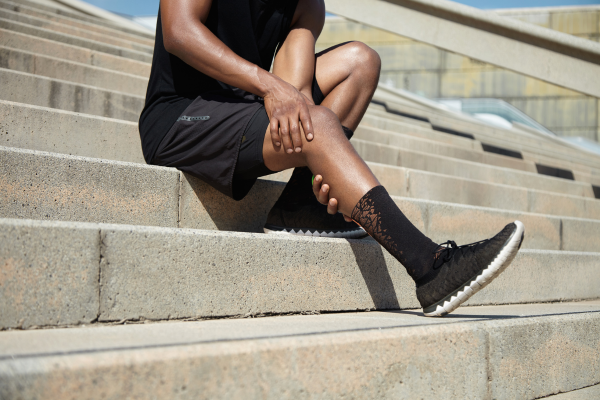Knee pain is a common issue affecting millions of people worldwide; in fact, frequent knee pain is an issue for around 25% of all adults! It’s usually caused by injury, overuse, or degenerative conditions like osteoarthritis.
Shockwave Therapy, also known as electric shock therapy, has emerged as a highly effective, non-invasive treatment option. This article delves into how Shockwave Therapy for knee pain works, its benefits, and why it may be the right choice for those seeking relief from knee pain.
What is Shockwave Therapy?
Shockwave Therapy (SWT) is a non-surgical treatment that uses high-energy acoustic waves to target painful areas and promote healing. Initially developed for kidney stones, this treatment is now widely used in treating musculoskeletal conditions and is particularly effective in managing knee pain.
Shockwave Therapy for knees delivers targeted waves to stimulate the body’s natural healing processes. It increases blood circulation, reduces inflammation, and accelerates tissue repair, making it a go-to option for conditions like patellar tendinopathy (jumpers knee), osteoarthritis, and other causes of knee pain.
Types of Shockwave Therapy
There are two main types of Shockwave Therapy for knee conditions:
Radial Shockwave Therapy (RSWT): Delivers energy across a broader area, ideal for treating conditions like jumper’s knee.
Focused Shockwave Therapy (FSWT): Provides more concentrated energy, effective for treating deeper tissues and chronic pain.
How Shockwave Therapy relieves knee pain
Shockwave Therapy for knee pain alleviates discomfort by triggering the body’s healing mechanisms. Here’s a breakdown of how electric shock therapy for knee pain can help:
Boosting blood circulation
For conditions like osteoarthritis, poor circulation can aggravate knee pain. Shockwave Therapy encourages the formation of new blood vessels, enhancing blood flow to the affected area. This improvement in circulation brings vital nutrients and oxygen to damaged tissues, promoting healing and reducing pain.
Stimulating collagen production
Collagen is essential for the health of tendons and cartilage, which can weaken or degrade due to injury or wear. Shockwave Therapy stimulates collagen production, helping restore the damaged structures within the knee and improve overall strength and function.
Reducing inflammation
Inflammation often plays a significant role in chronic knee pain, especially in conditions like bursitis. Shockwave Therapy works by reducing inflammation, breaking down calcified fibroblasts, and easing the associated discomfort. This reduction in swelling allows for improved mobility and long-term relief.
Breaking down calcium deposits
Calcium deposits, which can occur in conditions such as calcific tendinitis, cause stiffness and pain. Shockwave Therapy breaks down these calcium build-ups, allowing the body to reabsorb them naturally. This process significantly reduces pain and improves the range of motion.
Stimulating tissue regeneration
A major benefit of Shockwave Therapy for knee pain is its ability to trigger tissue regeneration. By promoting the repair of damaged cells and tissues, Shockwave Therapy provides long-lasting relief from pain, reducing the likelihood of recurrence.
Knee conditions treated with Shockwave Therapy
Shockwave Therapy can be highly effective for various knee conditions, including:
Patellar Tendinopathy (Jumper’s Knee): Most common among athletes, this condition causes pain in the tendon connecting the kneecap to the shinbone. Shockwave Therapy helps this kind of knee pain by stimulating healing through increased blood flow and collagen production.
Osteoarthritis: A degenerative joint disease that causes cartilage breakdown in the knee. Shockwave Therapy for knee osteoarthritis promotes tissue repair, reduces inflammation, and helps alleviate chronic pain.
Chondromalacia Patellae: Also known as runner’s knee, this condition results from the softening of cartilage beneath the kneecap. Shockwave Therapy assists in cartilage regeneration and reduces inflammation.
Calcific Tendonitis: This condition occurs when calcium deposits form within the knee tendons, causing discomfort. Shockwave Therapy helps to dissolve these deposits, alleviating pain.
Bursitis: Inflammation of the bursae (small fluid-filled sacs that cushion the knee joint) can cause sharp pain and limit movement. Shockwave Therapy reduces this inflammation, easing the pain and discomfort.
What to expect from Shockwave Therapy for knee pain
A typical session of Shockwave Therapy for knee pain lasts between 15 and 30 minutes. The procedure is non-invasive, and no anaesthesia is required. A gel is applied to the knee, allowing the shockwaves to penetrate the tissue more effectively. Patients may experience mild discomfort during the treatment, but this subsides quickly.
Most patients require three to six sessions for optimal results, with noticeable improvements occurring over time. There is little to no downtime following the treatment, although patients are advised to avoid high-impact activities during the treatment period.
The effectiveness of Shockwave Therapy for knee pain
Studies have shown that Shockwave Therapy for knee pain is highly effective. Research published in the Journal of Orthopaedic Surgery and Research demonstrated significant improvements in patients with knee osteoarthritis who underwent SWT treatments. Similarly, a study highlighted the effectiveness of Shockwave Therapy for patellar tendinopathy, showing marked pain reduction and improved knee function.
Success rate in Shockwave Therapy for knees
The success rate of Shockwave Therapy for knee pain ranges from 65% to 85%, depending on the condition being treated. For patients with chronic knee pain that has not responded to other treatments, Shockwave Therapy can provide long-term relief and restore mobility.
Who can benefit from Shockwave Therapy?
Shockwave Therapy for knee pain is ideal for individuals who have not found relief from traditional treatments, such as physiotherapy, medication, or corticosteroid injections. It is also a great option for those looking for a non-invasive alternative to surgery.
Patients suffering from conditions such as patellar tendinopathy, osteoarthritis, or calcific tendinitis can benefit from the regenerative effects of Shockwave Therapy. However, it may not be suitable for people with certain medical conditions, such as blood clotting disorders, infections in the knee area, or for women who are pregnant. Always consult with your doctor or a healthcare professional before starting SWT.
Advantages of Shockwave Therapy for knee pain over other treatments
When comparing Shockwave Therapy for knee pain to other treatment options, several advantages stand out:
- Non-invasive: Unlike surgery, Shockwave Therapy requires no incisions, and recovery time is minimal.
- Quick sessions: Each treatment is relatively short, making it easier to fit into busy schedules.
- Minimal side effects: Compared to medications or injections, Shockwave Therapy has very few side effects and is well tolerated.
- Effective for chronic conditions: Many patients with long-term knee pain report significant improvements after SWT, especially when other treatments have failed.
Shockwave Therapy for knee pain is a powerful, non-invasive solution for those suffering from various knee conditions. By stimulating the body’s natural healing mechanisms, SWT not only alleviates pain but also promotes tissue repair, reduces inflammation, and improves mobility.
Whether you are dealing with patellar tendinopathy, osteoarthritis, or another knee condition, Shockwave Therapy may provide the relief you’ve been seeking. If you are interested in exploring how Shockwave Therapy for knees could help alleviate your knee pain, contact Carl Todd Clinics to book a consultation. Our expert practitioners are here to support your journey towards a pain-free life!





